-
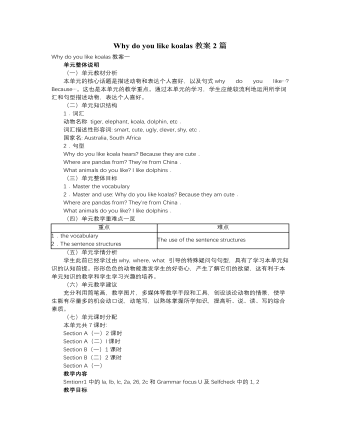
人教版新目标初中英语七年级下册Why do you like koalas教案2篇
单元整体说明(一)单元教材分析本单元的核心话题是描述动物和表达个人喜好,以及句式why do you like…? Because…。这也是本单元的教学重点。通过本单元的学习,学生应能较流利地运用所学词汇和句型描述动物,表达个人喜好。(二)单元知识结构1.词汇动物名称 tiger, elephant, koala, dolphin, etc.词汇描述性形容词: smart, cute, ugly, clever, shy, etc.国家名: Australia, South Africa2.句型Why do you like koala hears? Because they are cute.Where are pandas from? They're from China.What animals do you like? I like dolphins.(三)单元整体目标1.Master the vocabulary2.Master and use: Why do you like koalas? Because they am cute.Where are pandas from? They're from China.What animals do you like? I like dolphins.(四)单元教学重难点一览(五)单元学情分析学生此前已经学过由why, where, what 引导的特殊疑问句句型,具有了学习本单元知识的认知前提。形形色色的动物能激发学生的好奇心,产生了解它们的欲望,这有利于本单元知识的教学和学生学习兴趣的培养。
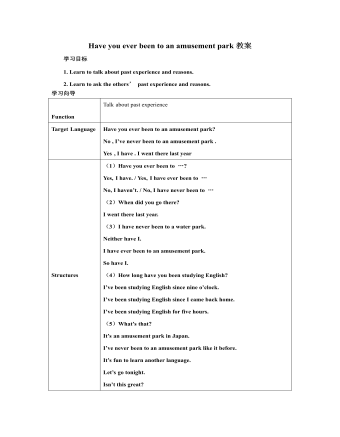
人教版新目标初中英语八年级下册Have you ever been to an amusement park教案
(1)Have you ever been to …? Yes, I have. / Yes, I have ever been to …No, I haven’t. / No, I have never been to …(2)When did you go there? I went there last year. (3)I have never been to a water park. Neither have I. I have ever been to an amusement park. So have I. (4)How long have you been studying English? I’ve been studying English since nine o’clock. I’ve been studying English since I came back home. I’ve been studying English for five hours. (5)What’s that? It’s an amusement park in Japan. I’ve never been to an amusement park like it before. It’s fun to learn another language. Let’s go tonight. Isn’t this great?space museum, amusement park, water park, South America, Peru, Holland, European culture, tour guide, flight attendant, musical instrument, more than, be from, get to, take lessons, neither, discover, graduate, change
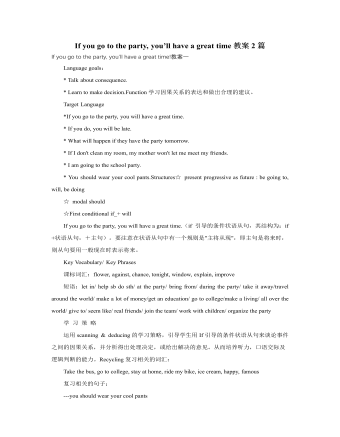
人教版新目标初中英语八年级下册If you go to the party, you’ll have a great time教案2篇
区分宾语从句、定于从句和状语从句宾语从句和状语从句,都叫做主从复合句。宾语从句主要是中考必考的,是初中阶段必掌握的从句,宾语从句主要是掌握三要素,所谓宾语从句,就是宾语在主从复合句当中充当宾语的一个句子,叫做宾语从句。主句的谓语动词是及物动词,后面如果是词或者是短语的话,是简单句,如果是句子的话,肯定是宾语从句。I know that he good at English.就是宾语从句,三要素,一要素是要注意连词,连词一共学了三类连词,一类连词是that口语当中可以省略,就像刚才说的那一句,I hear he is good at English.还有疑问代词、疑问副词,how where when,疑问代词、疑问副词。还有一类连词weather是否的意思,不是状语从句当中的如果,这一定要和如果区分开,这是是否。I don't know if he interested at English。宾语从句要注意if是连词。第二要素是语序,要用陈述举语序。比如说你家有几口人,我们都说How many people are there in you family?但是这是简单句,一旦说成宾语从句,你可以告诉我你家有几口人吗?Could you tell me how many people there are in you family ?

人教版新目标初中英语八年级下册It’s a nice day, isn’t it教案2篇
"Hello! Welcome to English class! Introduce yourself. Meet your new classmates." That's what the teacher says. What do you say? "Oh no!" It can be difficult talking to new people. But it can be fun, and you can make friends. How do you do it? Make small talk. Small talk is polite conversation. "Wang Nan is a great pingpang player, isn't she?" "I'd love to meet her, wouldn't you?" "It's been raining a lot, hasn't it?" Tag questions are a form of polite speech. To make small talk successfully, you should know how to make them. You should also know what topics to talk about. Try to learn this unit carefully. The next time you're in English class, you'll find out. Making small talk's easy, isn't it? (“你好!欢迎你!请做一下自我介绍。认识一下你的新同学。”通常在课上老师会这样说。你会说什么呢?“噢,不!”与陌生人谈话太困难了。但是这也很有意思,并且你还能交到朋友。你该怎么做呢?闲聊。闲聊指得是礼貌的对话。“王楠是一个很棒的乒乓球运动员,不是吗?”“我希望自己能认识她,你呢?“今年的雨水很多,不是吗?”反意疑问句是一种礼貌用语。为了使得谈话成功,你应该知道怎样去进行闲聊。你还应该知道与不同的人该谈论什么样的话题。认真的学习这个单元吧,下次在英语课上,你会发现与大家展开谈话是一件很容易的事情,不信我们来试试。)

人教版新目标初中英语八年级下册He said I was hard-working教案2篇
This activity introduces some new vocabulary and provide oral practice using the target language.Task 1 . Ask four students to stand in front of the class, and the teacher asks them the following questions as a reporter.1.What are you going to do when you grow up?2.What are you going to do next week?3.What are going to do after school?The students will give different answers, then ask a good student to report what they said.I am going to e a doctor.What did she say?----------She said she was going to be a doctor.I am going to have a party on Friday night.What did he say?-------He said he was going to have a party on Friday night.I am going to do my homework.What did she say ?------ She said she was going to do her homework.I am going home after school.What did she say?-----She said she was going home after school.Say In this unit we are going to learn to use words like to report what someone said.Task 2. Read the instructions. Then ask a student to read the four questions. And write the words on the Bb. Explain what soap opera is.Task 3. Ask the students to Look at the pictures, point out the TV screens in the picture. Ask one girl to read what Marcia said.What did Marcia say? She said She said she was having a surprise party for Lana on Friday night. Repeat the other pictures in the same way.Activity3. Listen and number the pictures in activity 1a.

人教版新目标初中英语八年级下册What were you doing when the UFO arrived教案2篇
(一).知识方面: 1.培养学生能运用过去进行时来描述、谈论过去某个时间正在发生的事情或动作的意识和能力,能就过去某个时间正在发生的动作做出正确的描述。 2.培养学生的想象力和角色扮演的合作能力。 3.培养学生讲述过去发生的事情经过的能力。能正确运用一般过去时来讲述故事。 (二).技能方面: 1.本单元的语言目标是Talk about past events and tell a story(谈论过去的时间和讲述一个故事),围绕这一目标,要涉及句型: What were you doing when the UFO arrived? ----I was sitting in the barber’s chair. The barber was cutting my hair. 因此必须学习standing、studying、cleaning、sleeping、cooking、making、eating、cutting、等表示地点的词,以便为上述句型提供语言材料。2.学习过去进行时的有关知识。Was/were+现在分词,是该时态的表达式。 3.在学习过程中,要区分The boy was walking down the street when the UFO landed.和While the boy was walking down the street, the UFO landed.这两种由when和while引导的状语从句的句型结构。注意它们的不同。
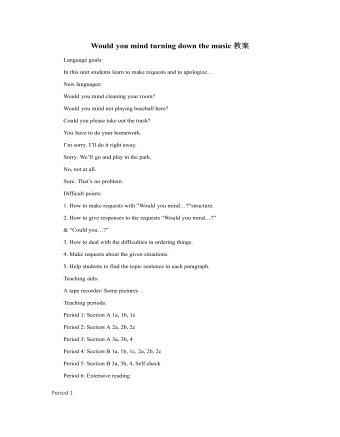
人教版新目标初中英语八年级下册Would you mind turning down the music教案
Step 4. Group work (4)1. Ask a pair of students to read the dialogue. Say, This activity provides speaking, listening and writing practice using the target language.2. Ask students to complete the work in groups.3. Check the answers with the whole class. 4. Explain some of the language points. Step 5. Word review (Self check 1)1. Ask students to read the words and the phrases given. 2. Fill in the blanks with proper forms of these words to complete the sentences. 3. Check the answers with the whole class. Homework:Do activity 2 on page 57 after class. Period 6Teaching aims: 1. Teach vocabulary words and the useful expressions. 2. Enable the students to learn etiquette in different culture. 3. Help the students learn how to behave politely in public places and in daily life. Teaching procedures:Step 1. RevisionHelp students to review the function of making requests through a free talk. Then lead them to the topic of etiquette. Explain the meaning of etiquette. Or, ask students to look it up in the dictionary. Step 2. Pre-reading (Section 1)1. Ask students to read the picture and make a list with their partner about how many rules of etiquette can be seen being broken.

人教版新目标初中英语九年级下册By the time I got outside, the bus had already left教案
Ⅰ. Teaching Aims and Demands1. Knowledge Objects(1) Key Vocabularyoversleep(2) Target LanguageWhat happened?I overslept. And by the time I got up, my brother had already gotten in the shower.2. Ability Objects(1) Teach the students to use the new words.(2) Train the students to narrate past events with the Past Perfect Tense.(3) Train the students' listening and speaking skills with the target language.3. Moral ObjectIt’s a good habit to go to bed early in the evening and get up early in the morning. So you’ll never be in a hurry in the morning.Ⅱ. Teaching Key Points1. Key Vocabularyoversleep2. Target LanguageNarrate past events with the Past Perfect TenseⅢ. Teaching Difficult Points1. Train the students to narrate past events with the Past Perfect Tense.2. Train the students to understand the target language in spoken conversation.Ⅳ. Teaching Methods1. Thinking of examples from the students' real lives.2. Making sentences by looking at the pictures.Ⅴ. Teaching AidA tape recorderⅥ. Teaching ProceduresStep I Revision1. Revise the language points in Unit 8.Ask some questions like this: What volunteer work would you like to do?Help the students to answer, I’d like to…/I love to…/I hope to2. Practice the dialogue in Activity 3c on page 62 again. Get students to role play the similar dialogues with the following.

人教版新目标初中英语九年级下册Rainy days make me sad教案
1. 教材分析本单元以how do things affect you?为话题, 从颜色、天气、音乐、广告、产品等方面谈论了外界事物如何影响人的心情。要求学生掌握表达某物或某事给人带来的感觉、看法或影响等。共设计了四个部分的内容:Section A 该部分有4个模块:第一模块围绕Which restaurant would you like to go to?这一话题展开思维(1a)、听力(1b)、口语(1c)训练;第二模块围绕How does music affect you? 进行听力(2a-2b)、口语训练(2c);第三模块继续围绕how do colors in the restaurant affect you这一话题展开训练,训练形式为阅读和问题体验(3a)和小组活动(3b);第四模块仍就How do things affect you这一话题以调查的形式展开讨论。Section B该部分有4个模块:第一模块围绕产品广告对人们的影响这一话题以“配对”(1a)与“列举”(1b)两种形式展开训练;第二模块继续围绕How do things affect you? 进行听力(2a-2b)、口语对话训练(2c);第三模块围绕“Advertising”这一话题展开阅读(3a-3b)和写作(3c)训练;第四模块围绕How posters affect you这一话题以口语训练形式展开小组活动。

人教版新目标初中英语九年级下册Could you please tell me where the restrooms are教案
Step Ⅰ RevisionCheck homework. Ask a few students to read the article in 3a.Then ask a few students to read their guides.Step Ⅱ Part 1Look at the words in the box. Ask a student to read them. Make sure the students understand the meaning of the words. You are to fill in the blanks with the words. In some cases, students may need to use another form of the word, for example adjusting for tense or subject/ verb agreement.Ask students to fill in the blanks on their own.Check the answers. Step ⅢPart 2Go through the instructions with the class.Look at the example with the students.Ask students what the answer would be.Ask a student to read the question and answer it.Excuse me, could you tell me where the bank is, please?The bank is across the street from the shopping malt.Get students to complete the work in pairs.Check the answers. Ask a few students to read their questions.Step Ⅳ Just for Fun!Ask all the students to read the conversation. Ask: What is funny about this cartoon? Help students to explain. A Martian is a person from the planet Mars.There is no such thing as Martian food on Earth, and the clerk looks silly because he is trying to think of where there is a Martian restaurant.Invite some pairs of students to present this conversation to the rest of the class.Step Ⅴ Summary and HomeworkIn this class, we’ve done much writing practice using the key vocabulary words and the target language presented in this unit. After class, please finish the questions in 2 in your exercise books. Then finish the exercises on pages 47~48 of the workbook as well.The Seventh Period Ⅰ Teaching Aims and Demands1. Knowledge Objects(1) Key Vocabularyimage, adventure, jealousy, hero, crime, journey, brave, no longer, show interest in, take it easy, become interested in, plain looks(2)Text:Grown-ups like cartoons, too.2. Ability Objects(1) Fast-reading to get a general idea of the text.(2) Careful-reading to get the detailed information in the text.

人教版新目标初中英语九年级下册We’re trying to save the manatees教案2篇
本单元主要围绕着有关濒临灭绝的动物这一话题,学习了应该怎样保护我们的环境,以及就某一问题展开辩论。目标提示语言目标能够运用所学知识,就某一问题展开辩论。认知目标1、复习一些语法:现在进行时、一般现在时、用used to 表示一般过去时、现在完成时、一般过去时的被动语态。2、学会表达同意和不同意。3、学会以下基本句型:We’re trying to save the manatees.Manatees eat about 100 pounds of food a day.There used to be a lot of manatees.In 1972,it was discovered that they were endangered.Some of the swamps have become polluted.情感目标了解一些濒临灭绝的动物的生活习性和濒临灭绝的原因,教育学生应该如何保护环境。教学提示充分利用多媒体等教学设备,创设与本课话题相关的情境,如各种不同种类的动物、动物园以及有关环境的画画等等。围绕着本单元的教学目标,设计一些贴近学生实际的教学任务,如让学生谈论自己最喜欢的动物,如何拯救濒危动物,如何保护环境等等。让学生根据所学知识,就动物园是否对动物有利以及其他的话题进行辩论。
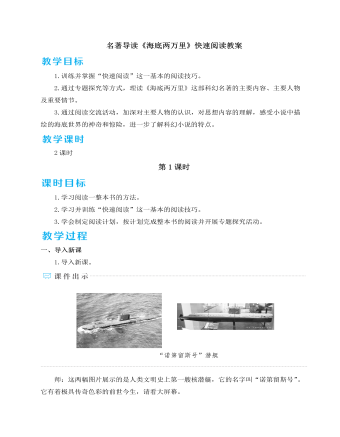
人教部编版七年级下册名著导读《海底两万里》快速阅读教案
【设计意图】这三个活动对培养学生的思维能力各有不同的目的和针对性。绘制航海路线图,讲述旅途精彩故事,可以帮助学生梳理全书的故事情节;写航海日记让学生深入到作品的情节中,对几个主人公的形象有更深入的理解;主题辩论既让学生对人物形象有更深入的思考,也有助于学生深入理解作品主题。三、活动结语师:读完《海底两万里》,相信同学们心中一定还有很多没有得到解答的疑问。尼摩船长的身世究竟是什么?他的亲人是怎么死的?他为什么要复仇?“诺第留斯号”潜艇最后的结局是什么呢?想要解开这些谜团,请看凡尔纳的另外两部科幻小说《格兰特船长的儿女》《神秘岛》,它们会带你揭开这些谜底。【设计意图】本环节旨在激发学生拓展阅读的兴趣,引导学生课外阅读凡尔纳的另外两部作品,扩大学生的阅读量。
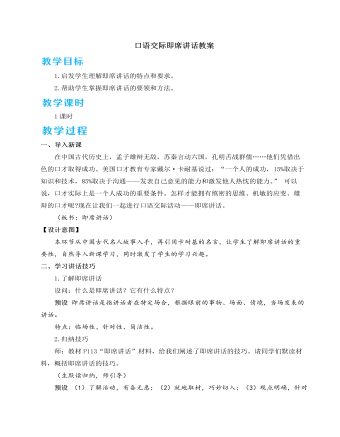
人教部编版语文八年级下册口语交际即席讲话教案
预设 示例:班上分享个人读书经验大家好!既然今天是交流读书体会,那么,我想结合自己的读书体会和大家聊聊读书。一个爱读书的民族,必定是一个文化素质较高的民族;一个爱读书的人,也必定是一个文化素质较高的人。读书能开阔我们的视野,提高我们的写作水平;读书能提升自身修养,丰富我们的人生底蕴。读书是我们精神的呼吸,能让人保持平淡的心境,变得博爱而无私。为了让我们的生活和心灵变得轻盈一些,我们需要读书。那么,应该怎样读书呢?其一,要择书而读。需要的才是最适合的,读适合的书才能有良多收获。如果没有特别需要的书要读,可以读经典。经典是经过岁月沉淀下来的人类智慧的结晶,可以让我们触摸先贤的思想,以充实自身。其二,要读而有术。要对好书反复品味,将其内化吸收,然后进行批判性阅读,有自己的思想主张和拓展探究价值判断;在读书过程中与作者进行辩论,最后形成自己的思想体系,为我所用,而不是让自己的脑袋成为别人思想的“跑马场”。
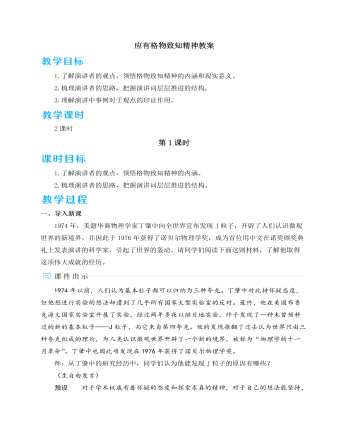
人教部编版语文八年级下册应有格物致知精神教案
1.了解演讲者的观点,领悟格物致知精神的内涵。2.梳理演讲者的思路,把握演讲词层层推进的结构。 一、导入新课 1974年,美籍华裔物理学家丁肇中向全世界宣布发现J粒子,开辟了人们认识微观世界的新境界,并因此于1976年获得了诺贝尔物理学奖,成为首位用中文在诺奖颁奖典礼上发表演讲的科学家,引起了世界的轰动。请同学们阅读下面这则材料,了解他取得这项伟大成就的经历。1974年以前,人们认为基本粒子都可以归纳为三种夸克。丁肇中对此持怀疑态度,但他想进行实验的想法却遭到了几乎所有国家大型实验室的反对。最终,他在美国布鲁克海文国家实验室开展了实验,经过两年多夜以继日地实验,终于发现了一种未曾预料过的新的基本粒子——J粒子,而它来自第四夸克。他的发现推翻了过去认为世界只由三种夸克组成的理论,为人类认识微观世界开辟了一个新的境界,被称为“物理学的十一月革命”。丁肇中也因此项发现在1976年获得了诺贝尔物理学奖。
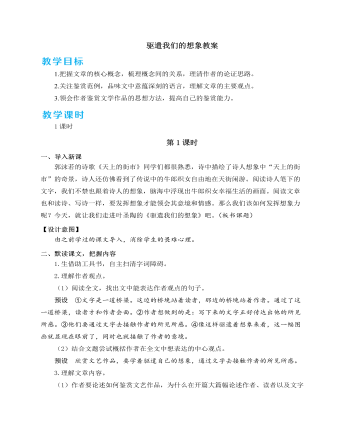
人教部编版语文九年级下册驱遣我们的想象教案
要了解语言文字,通常的办法是翻查字典辞典。这是不错的。但是现在许多少年仿佛有这样一种见解:翻查字典辞典只是国文课预习的事情,其他功课就用不到,自动地阅读文艺作品当然更无须那样了。这种见解不免错误。产生这个错误不是没有缘由的。其一,除了国文教师以外,所有辅导少年的人都不曾督促少年去利用字典辞典。其二,现在还没有一种适于少年用的比较完善的字典和辞典。虽然有这些缘由,但是从原则上说,无论什么人都该把字典辞典作为终身伴侣,以便随时解决语言文字的疑难。字典辞典即使还不完善,能利用总比不利用好。不过字典辞典的解释,无非取比照的或是说明的办法,究竟和原字原辞不会十分贴合。例如“踌躇”,解作“犹豫”,就是比照的办法;“情操”,解作“最复杂的感情,其发作由于精神的作用,就是爱美和尊重真理的感情”,就是说明的办法。完全不了解什么叫作“踌躇”、什么叫作“情操”的人看了这样的解释,自然能有所了解。但是在文章中间,该用“踌躇”的地方不能换上“犹豫”,该用“情操”的地方也不能拿说明的解释语去替代,可见从意义上、情味上说,原字原辞和字典辞典的解释必然多少有点距离。

人教版新目标初中英语七年级下册Where is the post office教案2篇
Period 2 (3a----Section B 2c)Preview(Pre-task): Key points: What laAdd another information about their pen pals----their language on the cardnguage does she/he speak?She/He speaks....Does she/he have any brothers and sisters? Does she/he speak English?Preview(Pre-task): Add another information about their pen pals----their language on the cardKey points: What language does she/he speak?She/He speaks....Does she/he have any brothers and sisters? Does she/he speak English?Step 1 Revision1.Revisionand dictation of the new words 2.Revise the drills they learned yesterday.(by pairwork and grammar exercise)Step 2 Leading-inT has a conversation with one student. The conversation is following:---Do you have a pen pal?---Yes, I do.---What's your pen pal's name? ---His/Her name is....---Where is your pen pal from? ---He/She is from...---Where does he/she live? ---He/She lives in....---What language does he/she speak?He/She speaks...Write the new words on the Bb. They are following: EnglishChineseJapaneseFrenchStep 3 LearnLearn the new words with the whole class.Finish 3a with the students3b Pairwork T still does an example with one student Then the Ss practise in pairs. The example is following:--Curry Muray is my pen pal. He is from the United States.---What language does he speak?
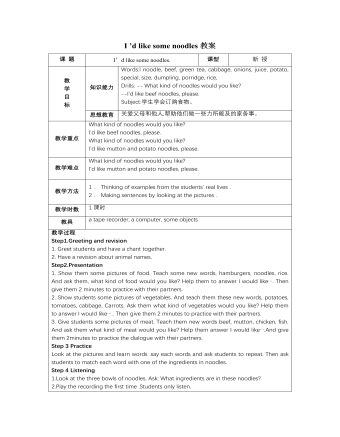
人教版新目标初中英语七年级下册I ’d like some noodles教案
教学过程Step 1: warming-up Sing a song---------“food and drink” Step 2: Revision1 Dictation2 Revise: What kind of noodles would you like?I’d like …What size bowl of noodles would you like?I’d like…Step 3: Presentation1 show pictures of food, ask students say the words.2 Students read the newspaper ad in 3a. Fill in blanks with words in the box. Then read the ad together, the teacher explains some difficult language points.3 Check the answers Step 4 PracticeAsk students to finish 3b in the same way according to 3a. Students read the short passage and fill in the blanks .At last, check the answers.Step 5 productionAsk students to write their own ad for dumplings, noodles, drinks, and other foods they know. Then ask students to read their partner’s ad. Then order food and drink from their partner.Step 6 Home workGroup work – make an ad about “food and drink”
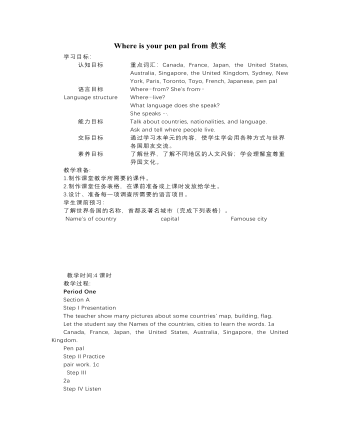
人教版新目标初中英语七年级下册Where is your pen pal from教案
2.1Match the country with the language.Step II Reading3a? let the students read the letter fast and answer the questions.? Let the students ask more questions about the letter as possible as the can.Step III Writing3b.Step IV. Pairwork2cStep V Listening2a, 2bStep V. HomeworkExercises book(1) P3Exercises book (2) P3Period FourStep I . Dictate the words and sentences in Unit1.Step II. Self-checkStep III. Check the answers for Exercises book in the unit.Step IV. Home workRevise and preparation for unit 2.教学反思:通过本单元的学习,学生基本可以谈论人们的国籍,居住城市及其所说的语言,通过书信方式去介绍自己并寻找笔友。但在涉及到国外的一些城市时,学生对这方面的知识相对欠缺,能介绍的城市并不多,也反应出学生课前预习不充分,这跟学生学习条件也有关,大多数学生无法通过网络获取所需信息。因此,在以后的教学中要多指导学生通过计算机网络获取信息,拓宽知识面。
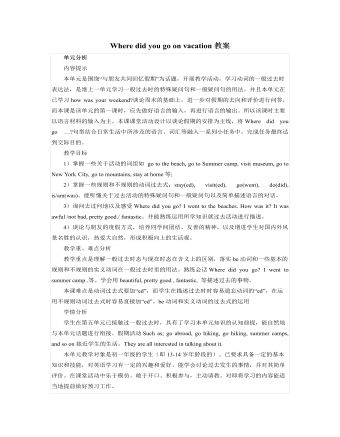
人教版新目标初中英语七年级下册Where did you go on vacation教案
句型: Where did you go on vacation? I went to summer camp.Did she go to Central Park?Yes,she did.No, she didn’t语法:一般过去时特殊疑问句、一般疑问句及肯、否定回答。课时安排4课时第一课时:Section A:la,1b,lc,2a,2b,2c 第二课时:Section A:3a,3b,4第三课时:Section B:1,2a,2b,2c第四课时:Section B:3a,3b,3c,4 and Self Check第一课时教学目标掌握描写假期生活的形容词。假期里自己所做事情的简单表达。谈论假期做的事情及当时情况。谈论假期时旅游的天气,旅游者以及食物等。教学过程一、导入播放一首英文歌曲:Let’s travel 说明:通过让学生听节奏欢快迪斯尼英语歌曲Let’s travel.引入本节课谈论的话题vacation and travel. 让歌曲使学生的思维活跃,增强课堂气氛,激发学生提高学习英语的兴趣。T:How is the trip ?Ss : It’s pretty good/ happy/exciting /relaxing/busy/dangerous/ fantastic说明:这个问题是为了操练形容词。建议让多个Ss作答。鼓励他们用不同的形容词。上述个别形容词本应在第二课时中出现,但可以在warming-up中第一次非正式出现。这些形容词也可在老师的评价语中适时出现,以加深学生对词汇的印象。
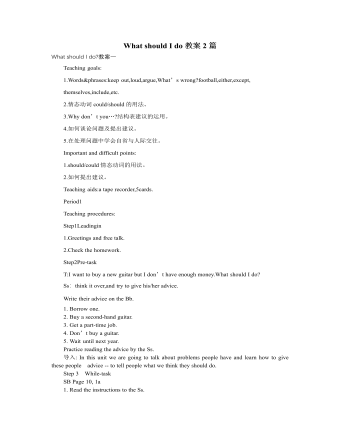
人教版新目标初中英语八年级下册What should I do教案2篇
说明:在帮Li Lei提建议的同时,教育学生如何学好英语。第三课时教学目标1. 语言目标:a) 词汇: Original, in style, haircut, the same as.b) 语言结构:My friend wears the same clothes and has the same haircut as I do.2. 能力目标:大多数学生能够谈论自己喜欢哪种服装,提高查找信息的能力。3. 情感目标:学会如何与朋友相处,要有自己对时尚的看法。教学重点掌握一些重要词汇。教学难点学会谈论问题,并能提出书面建议。◆教学突破首先针对Erin的问题,提出个人的建议,模仿2c部分的对话展开双人交际Pair-work;听老师诵读3a部分的信件,并找出LEFT OUT的问题所在;学生完成3b部分的内容,给Left Out提出书面的建议;学以口头形式提出自己目前存在的某个问题,讲给大家听,让同学们给自己提出一个建议,并作笔录;学生两、三个人分成一组,随意性地进行口语交际,谈论P14的第4部分的某个问题,相互交换意见。





